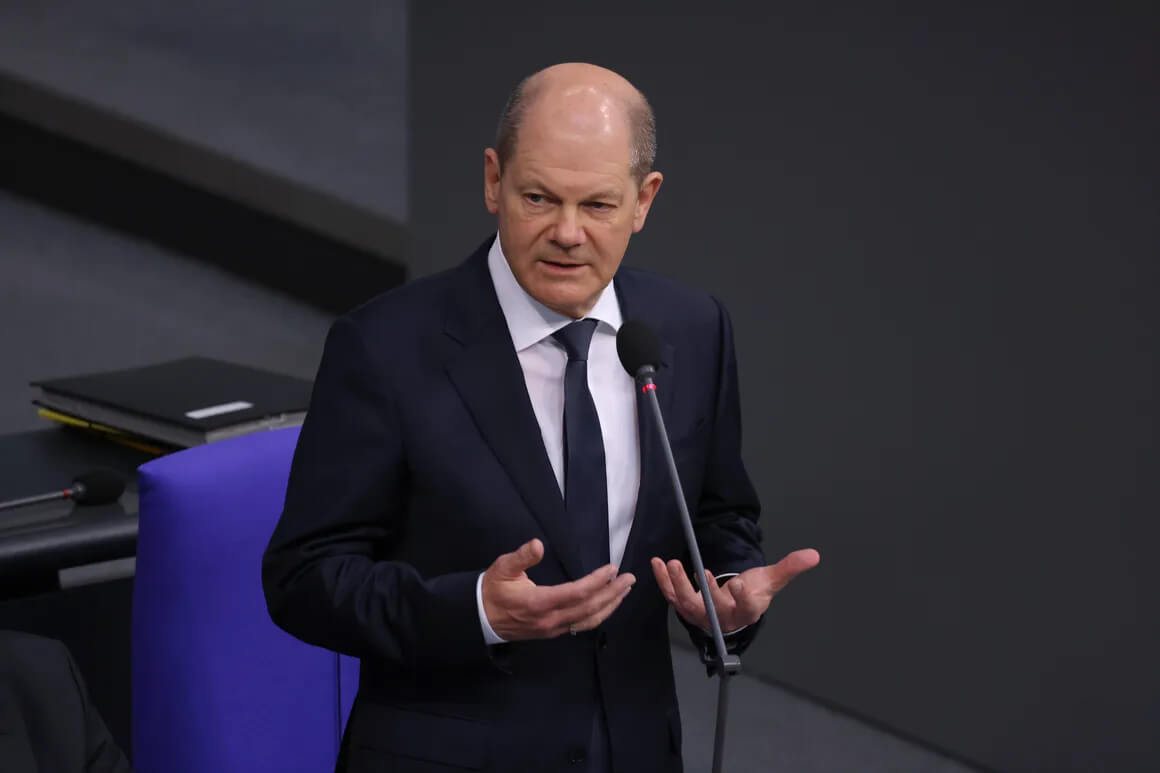During a telephonic conversation on Tuesday, Russian President Vladimir Putin reassured German Chancellor Olaf Scholz that Moscow is a “reliable” energy supplier and has fulfilled its “contractual obligations.”
According to a statement put out by the Kremlin, Putin blamed any disruptions, such as the suspension of gas supply to Germany via Nord Stream 1, on “anti-Russia sanctions.”
Putin added that the decisions to stop gas supply via Ukraine and Poland and the “refusal” to initiate supply via Nord Stream 2 were not made by Russia, arguing that “the attempts to shift the blame for Europe’s energy problems onto Russia look very cynical.”
While the German statement did not make any mention of their conversation on energy supply, the Russian statement excluded Scholz’s call for a ceasefire, the “complete withdrawal of Russian troops, and respect for the territorial integrity and sovereignty of Ukraine.”
Scholz warned that “any further Russian annexation steps would not go unanswered and would not be recognised under any circumstances.”
The German chancellor urged Russia to respect international humanitarian law, particularly the Geneva Convention, with respect to captured combatants. He added that the International Committee of the Red Cross (ICRC) should be given “unhindered access” to prisoners of war (POWs).
90 minutes phone call with #Putin: Russia must withdraw its troops from #Ukraine and recognize its sovereignty and territorial integrity. There is no other way to imagine a diplomatic solution.
— Bundeskanzler Olaf Scholz (@Bundeskanzler) September 13, 2022
In contrast, the Kremlin’s press release said Putin spoke to Scholz about Ukraine’s “flagrant violations of international humanitarian law,” including deadly attacks on civilian infrastructure in Donbas.
Putin stressed that, unlike Ukraine, Russia “grants the [ICRC] access” to POWs.
The pair also spoke about the Zaporizhzhia nuclear power plant (ZNPP), which Ukrainian President Volodymyr Zelensky has warned is just “one step away from a radiation disaster” due to “Russian provocation.”
Scholz urged Russian President Putin to avoid any steps that could worsen the situation and called for adherence to the International Atomic Energy Agency’s (IAEA) report, which called for the establishment of a nuclear safety and security protection zone around the ZNPP.
In response, Putin informed Scholz that Russia has taken “coordinated measures” to comply with the IAEA’s recommendations but “Ukraine is subjecting to continuous missile attacks, despite the serious risk of causing a major disaster.”
Disappointing signals from Germany while Ukraine needs Leopards and Marders now — to liberate people and save them from genocide. Not a single rational argument on why these weapons can not be supplied, only abstract fears and excuses. What is Berlin afraid of that Kyiv is not?
— Dmytro Kuleba (@DmytroKuleba) September 13, 2022
Scholz also raised concern about global food shortages, which he said have been exacerbated by Russia’s “war of aggression.” In this regard, the chancellor highlighted the importance of adhering to the United Nations and Turkey-brokered agreement between Russia and Ukraine in July to allow the transport of grains through the Black Sea. He urged Putin not to “discredit” the deal and to “implement it in full.”
Putin, however, said the deal has created a “geographic imbalance,” whereby only a “negligible share” of grains are reaching the “neediest” countries. He also raised concern that no efforts have been made to remove obstacles to Russian food and fertiliser exports.
The Russian press release said, “The President confirmed that Russia is ready to deliver large quantities of grain to external markets and to provide needy countries with the fertiliser blocked in European ports at no charge.”
Germany, the world’s fifth-largest exporter of arms and ammunition, has been criticised for its reluctance to expand military support to Ukraine. It locally produces the Leopold battle tank and has a large stockpile of Marder fighting vehicles. However, it has resisted pressure from the West and requests from Ukraine for tanks over fears that Russia could interpret it as a declaration of war.
Berlin has provided lighter military equipment such as grenades, anti-tank and anti-aircraft missiles. It has also delivered heavier weapons such as the howitzer and anti-aircraft tanks. However, Scholz previously said that Germany does not want to do “solo runs” and would not deliver heavy tanks until other allies did the same.
During the early stages of the war, it was also heavily reluctant to back proposals within the European Union to embargo Russian oil, though it ultimately performed a U-turn on this policy.
Since the onset of the military invasion of Ukraine, Germany pledged over $1 billion in financial aid to Ukraine. Earlier this month, for instance, it announced $500 million in military assistance and $199 million for displaced people.
Responding to Germany’s reluctance to provide expanded military support, Ukrainian Foreign Minister Dmytro Kuleba said Berlin’s decision is not based on a “single rational argument” and is driven by “abstract fears and excuses.”
The end of French exceptionalism.
— Dr John Chipman IISS (@chipmanj) June 4, 2022
Once you claim your main role to be a mediator between right and wrong, days of grandeur are over.
‘Saving face’ is a weak diplomatic aim; Putin can take personal responsibility for his face.
Humiliation: a mild punishment for war crimes. https://t.co/Y6LdFLP4aW
Scholz has also drawn criticism for his regular conversations with Putin, and has spoken to the Russian leader at least 11 times since the war began. He has previously said that continuing a conversation with Russia is “absolutely necessary” to end the war by finding a “common approach.
France, too, has also been criticised for taking a soft stand on Russia. For instance, French President Emmanuel Macron spoke with Putin just two days before Scholz. In total, he has spoken to Putin at least 14 times since Russia invaded Ukraine.
Macron has repeatedly emphasised that diplomacy must be kept on the table and also warned against isolating Russia. In June, he said, “We must not humiliate Russia so that the day when the fighting stops we can build an exit ramp through diplomatic means.”

